Natural predators offer superior mosquito control over chemicals by maintaining ecological balance rather than disrupting it. You’ll avoid harmful residues and health risks while supporting a self-sustaining solution that targets mosquitoes at all life stages. Predators like dragonflies, birds, and bats don’t just kill mosquitoes—they weaken surviving populations and prevent breeding. This approach saves money long-term and fosters biodiversity in your yard. Discover how to create the perfect predator-friendly environment for continuous protection.
Second-level Headings for “Why Mosquito Predators Beat Chemical Treatments”
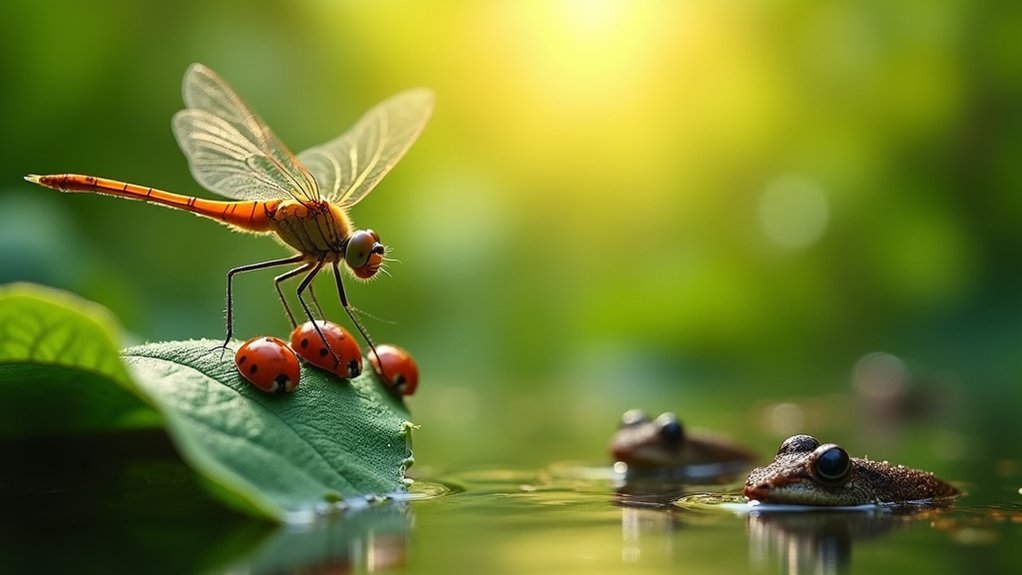
When developing content about mosquito control methods, you’ll need clear headings that highlight the advantages of natural predators over chemical treatments. Consider these options:
“Ecological Balance: Why Predators Preserve What Chemicals Destroy”
“Long-Term Solutions: Predator Sustainability vs. Chemical Dependency”
“Beyond Killing: How Predators Weaken Surviving Mosquito Populations”
“Integrated Approaches: Combining Predators with Targeted Biologicals”
“Economic Benefits: Reducing Costs Through Natural Predator Systems”
Each heading addresses a key advantage of mosquito predators over chemical alternatives. They emphasize how predatory insects maintain ecosystem balance while effectively controlling mosquito populations.
Unlike chemicals that indiscriminately kill beneficial insects, predators work within natural systems. They also highlight the sustainable, long-term benefits of predator-based solutions compared to the temporary fixes chemicals provide, while addressing the enhanced effectiveness when combining predator strategies with selective biological treatments.
The Hidden Dangers of Chemical Mosquito Control
The widespread use of chemical mosquito treatments conceals a troubling array of unintended consequences that extend far beyond the target pests.
When you spray pyrethroids around your home, you’re not just killing mosquitoes—you’re potentially harming beneficial insects like bees, which are essential for pollination and food production.
Your pets aren’t immune either, with exposure potentially causing vomiting and lethargy.
Pets can suffer vomiting and lethargy from the same chemicals meant to protect your yard.
Even your family faces risks, as chemical mosquito control can trigger skin irritation, dizziness, and nausea, with children being especially vulnerable.
The environmental impact extends further when rainwater carries these chemicals to nearby water bodies, poisoning aquatic life and disrupting entire food webs.
These cascading effects reveal why relying on chemical solutions often creates more problems than it solves.
Understanding Nature’s Mosquito Control System
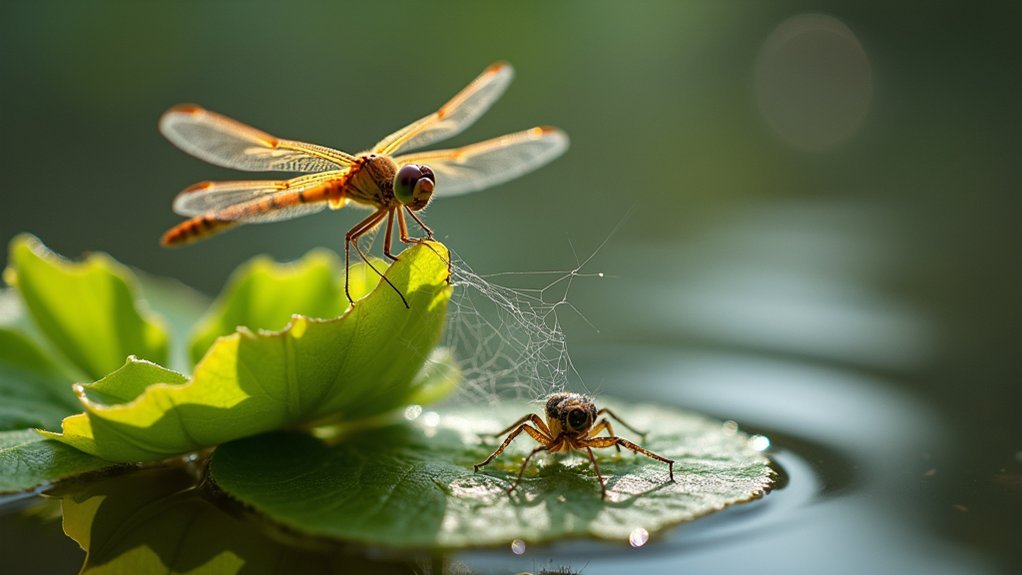
You’ll find that nature has already perfected mosquito control through a delicate food web where predators like backswimmers and damselflies keep larvae populations in check.
These biological control mechanisms work continuously without the harmful side effects of chemicals, maintaining ecosystem balance rather than disrupting it.
When predators consume mosquito larvae in habitats like bromeliads, they not only reduce mosquito numbers but also strengthen the entire ecosystem through natural species interactions.
Food Web Balance
Maintaining diverse ecosystems with robust food webs naturally controls mosquito populations without chemical interventions. When you support local biodiversity, you’re creating an environment where predators like bats, frogs, and dragonflies thrive—each consuming thousands of mosquitoes daily. This natural system works continuously without harmful residues or resistance issues.
These biological relationships create a self-regulating system that offers several advantages:
- Predatory insects target mosquitoes during their vulnerable larval stages, preventing population explosions before they occur.
- Natural predation induces stress responses in surviving mosquitoes, weakening their immune systems and reducing reproduction.
- Balanced ecosystems maintain multiple control mechanisms simultaneously, preventing any single mosquito species from dominating.
Research confirms that encouraging predator populations creates sustainable mosquito management with minimal environmental impact while promoting biodiversity—something chemical treatments simply can’t achieve.
Biological Control Mechanisms
While chemical treatments offer quick fixes, nature’s biological control mechanisms provide sophisticated, sustainable solutions for mosquito management. Predators like backswimmers and damselflies don’t just reduce mosquito populations—they create stress responses that weaken larvae survival rates.
You’ll find these natural predators remarkably effective when combined with biological pesticides. For instance, backswimmer cues greatly enhance Bti effectiveness, resulting in higher mosquito larvae mortality.
This two-pronged approach—predation plus insect growth regulators—can prevent metamorphosis in up to 90% of mosquito populations.
Even nonlethal predation plays an essential role by triggering behavioral and physiological changes that reduce mosquito fitness. By maintaining habitats that support these natural predators, you’re creating a sustainable ecosystem that manages mosquito populations while preserving environmental balance.
Top Mosquito-Eating Predators in Your Ecosystem
Your backyard ecosystem can host powerful mosquito fighters like backswimmers and mosquitofish that naturally devour larvae before they become biting adults.
Introducing these aquatic predators helps restore the ecological balance disrupted by urbanization and wetland loss, creating sustainable mosquito control without chemicals.
You’ll benefit not only from fewer mosquitoes but also from a more resilient local environment where predator-prey relationships naturally regulate pest populations.
Aquatic Predator Benefits
Natural ecosystems provide an impressive array of mosquito-controlling predators that can effectively reduce pest populations without chemical interventions.
By maintaining ponds and wetlands in your area, you’re supporting these natural predators that target mosquito breeding at its source.
Backswimmers from the Notonectidae family emit chemical cues that stress mosquito larvae, increasing their mortality rates before they can mature into biting adults.
Meanwhile, predatory Toxorhynchites rutilus mosquitoes actually feed on disease-carrying species like Aedes aegypti.
The aquatic ecosystem offers three key benefits:
- Mosquito fish (Gambusia affinis) consume large quantities of larvae, maintaining ecological balance
- Dragonflies and damselflies target both larvae and adult mosquitoes
- Natural predator populations self-sustain, providing ongoing control without reapplication
Natural Balance Restoration
Restoring ecological balance in your local environment starts with identifying the most effective mosquito predators that naturally inhabit your region.
You’ll find that dragonflies and their nymphs are powerhouse pest predators, devouring hundreds of mosquito larvae during their lifetime in aquatic ecosystems.
Introducing mosquito fish (Gambusia affinis) to your water features can dramatically reduce larval populations, as each fish consumes over 100 larvae daily.
Similarly, backswimmers weaken mosquitoes through both direct predation and by releasing stress-inducing chemical cues.
For targeted control, Toxorhynchites rutilus—a predatory mosquito species—specifically hunts disease-carrying mosquitoes like Aedes aegypti.
Dragonflies: The Aerial Mosquito Assassins
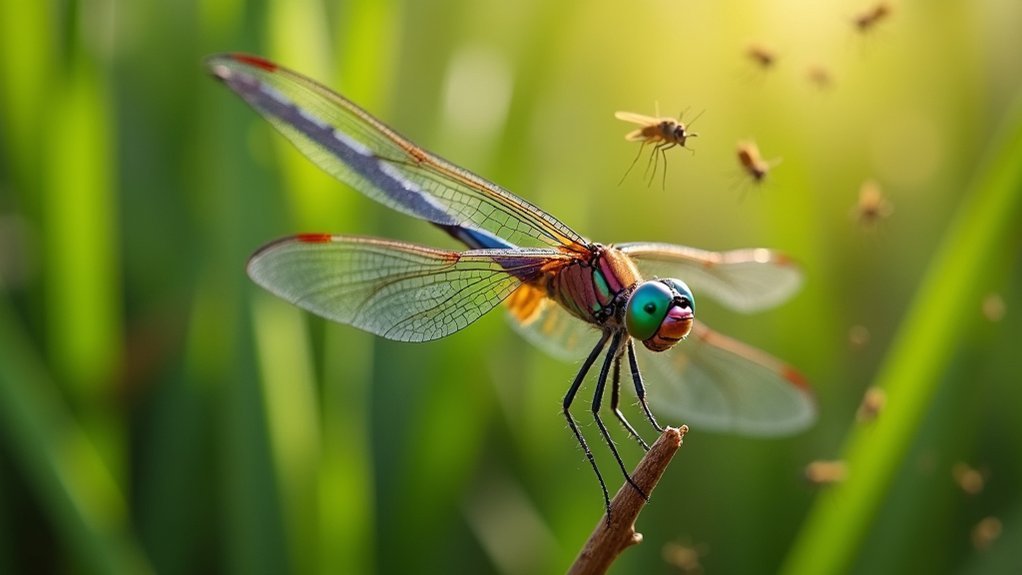
Among nature’s most efficient mosquito controllers, dragonflies reign supreme as aerial predators with remarkable hunting capabilities.
You’ll find these agile hunters consuming hundreds of mosquitoes daily during peak seasons, targeting both adults in flight and larvae in water.
Dragonflies control mosquitoes through their complete lifecycle intervention, making them invaluable allies in your backyard ecosystem.
- A single dragonfly can devour hundreds of mosquitoes per day using their exceptional mid-air hunting skills
- Dragonfly nymphs prey on mosquito larvae underwater, providing dual-stage population control
- Their presence indicates a healthy ecosystem with clean water and diverse habitats
When you support dragonfly populations in your landscape, you’re embracing nature’s solution to mosquito management without chemical interventions.
This creates a sustainable balance that benefits your entire outdoor environment.
Bats and Birds: Nighttime Mosquito Control Squad
You’ll find bats roosting in sheltered areas during daylight hours before emerging at dusk to consume up to 1,000 mosquitoes per hour during their nightly hunts.
Birds like purple martins and swallows complement this control effort, with a single family capable of devouring thousands of mosquitoes daily as they patrol your yard.
Bat Roosting Habits
While chemical mosquito treatments target insects indiscriminately, bats offer a natural and targeted solution by consuming remarkable quantities of flying pests at night.
Understanding their roosting habits can help you attract these beneficial creatures to your yard.
Bats prefer to roost in groups, with colonies ranging from just a few to thousands of individuals.
When you install bat houses in your garden, you’re providing ideal shelter for these nocturnal allies who can dramatically reduce mosquito populations.
- Man-made structures like buildings, bridges, and specially designed bat houses are preferred roosting sites for many bat species.
- A single colony can consume thousands of mosquitoes nightly when established near your home.
- Bat populations contribute to overall ecosystem health through pollination and seed dispersal alongside pest control.
Impressive Mosquito Consumption
The nighttime aerial patrol of bats represents just one part of nature’s complete mosquito defense system.
You’ll be amazed to learn that a single bat can devour up to 1,000 mosquitoes in just one hour during dawn and dusk feeding frenzies. That’s natural mosquito control at its finest.
Birds join this efficient pest management team during daylight hours.
Purple martins and swallows are particularly voracious, consuming thousands of flying insects daily, including significant numbers of mosquitoes.
When you support these natural predators by installing bat houses and bird nesting sites, you’re not just reducing annoying backyard pests—you’re helping decrease mosquito-borne diseases.
Unlike chemical treatments that harm beneficial insects and disrupt ecosystems, these natural controllers maintain ecological balance while efficiently reducing mosquito populations.
It’s nature’s sustainable solution to a persistent problem.
Creating Predator Habitats
Creating a welcoming habitat for nature’s mosquito controllers transforms your backyard into an effective defense zone against these persistent pests.
You’ll benefit from both day and night protection when you attract mosquito-hungry birds and bats to your property.
- Install bat houses in tree-lined areas to invite these nocturnal hunters, which can devour up to 1,000 mosquitoes hourly.
- Plant native vegetation that supports insectivorous birds like swallows and purple martins, enabling them to feast on hundreds of mosquitoes daily.
- Add water features with movement to attract both birds and bats while preventing mosquito breeding.
Aquatic Predators: Fish and Amphibians That Target Larvae
Nature’s underwater assassins play an essential role in controlling mosquito populations before they ever take flight.
Mosquito fish (Gambusia affinis) and guppies are particularly effective, consuming large quantities of mosquito larvae and reducing populations by up to 75% in treated areas.
Amphibians contribute considerably to this biological control system.
Tadpoles of various frog and toad species feast on mosquito larvae in ponds and standing water, helping to prevent mosquito breeding cycles before they can mature into biting adults.
These natural predators offer considerable advantages over chemical treatments by maintaining ecological balance without harmful environmental side effects.
Creating a Predator-Friendly Yard Environment

While chemical treatments offer temporary relief, transforming your outdoor space into a predator-friendly habitat provides sustainable mosquito control with lasting benefits.
By cultivating an environment that welcomes natural predators, you’ll reduce mosquito populations while enhancing your yard’s biodiversity.
To create this balanced ecosystem:
- Plant native flowering vegetation that attracts dragonflies, birds, and bats—powerful allies that consume hundreds of mosquitoes daily.
- Install birdhouses and bat boxes to provide shelter for these helpful predators, encouraging them to establish residence in your yard.
- Incorporate water features with movement and fish that prevent mosquito breeding while supporting predator populations.
These strategies not only control mosquitoes naturally but also create a healthier outdoor environment than chemical alternatives ever could—working with nature rather than against it.
Long-Term Ecological Benefits of Natural Predator Control
Beyond immediate mosquito control, embracing natural predators generates profound ecological benefits that chemical treatments simply can’t match. When you encourage biological controls in your ecosystem, you’re supporting a self-sustaining solution.
| Ecological Benefit | Natural Predators | Chemical Treatments |
|---|---|---|
| Sustainability | Self-perpetuating populations | Requires ongoing applications |
| Biodiversity | Enhances ecosystem resilience | Often harms beneficial insects |
| Resistance | No mosquito resistance development | Promotes pesticide resistance |
| Food Web Support | Strengthens natural cycles | Disrupts ecological relationships |
| Habitat Health | Improves water quality | Can contaminate water sources |
Economic Advantages of Predator-Based Mosquito Management
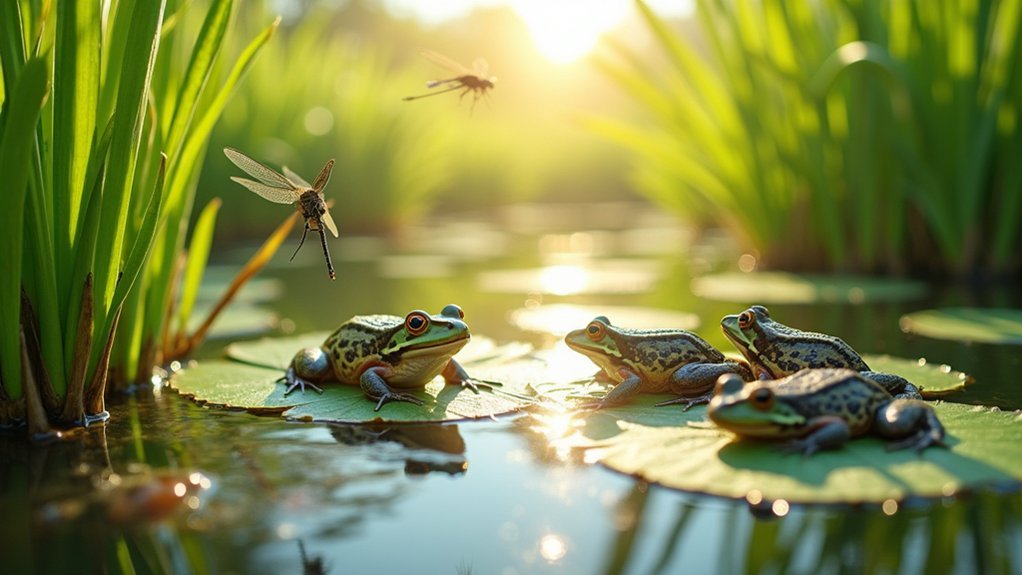
Although the ecological benefits of natural predators are compelling, the financial advantages might surprise you even more. When you reduce reliance on chemical treatments, you’ll experience immediate cost savings on pesticides and application expenses.
Consider these economic advantages of predator-based control:
- Using natural predators like backswimmers and dragonflies can markedly lower your pesticide expenditures while synthetic predator cues provide inexpensive alternatives to costly chemical solutions.
- You’ll benefit from long-term savings through integrated pest management strategies that minimize potential liability costs associated with chemical applications.
- Your community can reduce public spending on mosquito control programs while potentially saving billions in healthcare costs related to mosquito-borne diseases.
These financial benefits make natural predator approaches not just environmentally sound, but economically prudent.
Health Considerations: Chemicals vs. Natural Solutions
The health implications of your mosquito control choices extend far beyond simple pest management. When you opt for chemical mosquito treatments like pyrethroids, you’re exposing yourself and your family to risks including skin irritation, dizziness, and nausea—with children being particularly vulnerable to these effects.
Protecting your family from mosquitoes shouldn’t mean introducing new health risks to your home environment.
Natural solutions offer effective alternatives without the health concerns. Bacillus thuringiensis israelensis (Bti) targets mosquito larvae specifically while remaining safe for humans and pets.
Additionally, introducing natural predators like backswimmers and dragonflies helps maintain ecological balance.
Your choice also impacts the broader environment. Chemical sprays contaminate water sources and harm beneficial species like bees, which suffer disorientation or death from even minimal exposure.
Balancing Predator Populations in Urban Settings
While urban environments might seem inhospitable for natural mosquito control, your city spaces can actually become effective battlegrounds against mosquito populations when you strategically cultivate predator habitats.
Studies confirm that maintaining healthy populations of damselflies and backswimmers offers superior long-term results compared to chemical treatments.
You can enhance natural mosquito control by:
- Creating green spaces with bromeliads that provide essential predator habitats
- Implementing integrated pest management strategies that prioritize predator conservation
- Using minimal pesticides only when necessary, as chemicals often eliminate beneficial predators
When you reduce chemical treatments in urban areas, you’ll protect sensitive mosquito predators that would otherwise decline, preventing mosquitoes from dominating.
This balanced approach delivers sustainable control while preserving ecological harmony in your urban environment.
Seasonal Strategies for Enhanced Predator Effectiveness
Because mosquito populations fluctuate dramatically with changing seasons, you’ll need to adapt your predator-based control strategies throughout the year. Regular spring inspections to remove standing water will prevent breeding sites while creating space for natural predators to thrive.
| Season | Mosquito Control Strategies |
|---|---|
| Spring | Clean standing water; introduce Bti applications |
| Early Summer | Install bat houses; release Toxorhynchites larvae |
| Late Summer | Maintain native vegetation for damselflies |
| Fall | Prepare overwintering habitats for predator species |
Frequently Asked Questions
What Are the Disadvantages of Chemical Method of Controlling Mosquitoes?
Chemical mosquito control harms the environment. You’ll damage beneficial insects, contaminate water, and risk your family’s health. They’re ineffective long-term as mosquitoes develop resistance, requiring more chemicals without addressing breeding sites.
Why Are Mosquitoes Resistant to Insecticides?
Mosquitoes become resistant to insecticides because they reproduce rapidly and have short life cycles. You’ll find that their quick evolution allows them to develop genetic mutations that protect against chemicals you’re using to control them.
What Is the Best Predator for Mosquitoes?
You’ll find that various predators target mosquitoes effectively, but backswimmers, Toxorhynchites rutilus larvae, and damselflies stand out as top contenders due to their specialized feeding behaviors and ability to reduce mosquito populations considerably.
Does Spraying for Mosquitoes Hurt Pollinators?
Yes, mosquito spraying often hurts pollinators severely. Your chemical treatments like pyrethroids can kill bees, butterflies, and other beneficial insects, disrupt foraging behavior, and contaminate pollen and beeswax with toxic residues.
In Summary
You’ll find embracing nature’s mosquito control system offers superior results with fewer risks than chemical alternatives. By supporting predators like dragonflies in your ecosystem, you’re not only saving money but protecting your family’s health and the environment. Remember, it’s about balance—incorporating seasonal strategies and making your urban spaces welcoming to these natural allies will keep mosquitoes at bay effectively and safely.

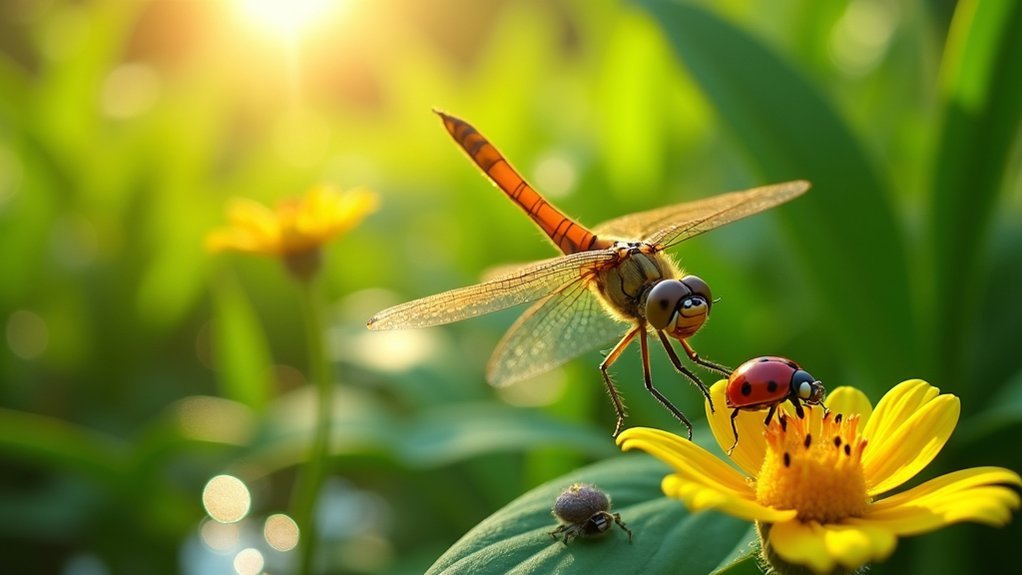



Leave a Reply